Standards in the field of ict реферат
Обновлено: 05.07.2024
Purpose: To prepare students using of modern computer information technology.
Plan:
1. Standards in the field of ICT.
2. Communication between ICT and achievement of the objectives of a sustainable development in the Millennium Declaration.
Standards in the field of ICT.
The main role in the development of the information society belongs to international standards. A standard is a document that sets out requirements, specifications, guidelines or characteristics for materials, products, processes and services. Standards can also be used to support an industrial or innovation police, for example, in acquiring new technologies.
ICT-standards system - a set of normative and technical and regulatory guidance documents, including a set of interrelated standards and other documents in the field of standardization related to ICT, documents defining the methodology of development, coordination, approval, modification, deployment, use and replacement, including a methodology to assess facilities for compliance with these standards and other documents in the field of standardization.
ICT industry - as a specific field of activity, which includes research, creation, development, evaluation, procurement, acquisition, implementation, operation and utilization of ICTs. It covers thus work as a developer and ICT suppliers and customers and users of ICT, including the activities for the implementation, operation and utilization of ICTs.
Industry Standard (IS) - standard related to processes, products and other aspects of a particular field of activity (whether commercial or not aimed at profit). In this document, under the industry standard it refers to a standard or other document in the field of standardization, designed for the use of ICT. The procedure for the development and application of established IS specialized body of public administration.
Standard - a document in the field of standardization, standardization of relevant principles, covering categories such documents as the standard of organization, the standard non-profit association, the industry standard or set of rules (the industry), the national standard, international standard.
International standard - a standard adopted by an international organization.
National standard - a standard adopted by a national authority of the Republic of Kazakhstan for Standardization.
Non-profit association Standard - a standard non-profit professional organization (union, association, etc.), designed for wide application by different stakeholders. The order of development of the standard and non-profit association established this association and is harmonized with the state and industry standards development orders.
Study Groups of the ITU Telecommunication Standardization Sector (ITU-T) unite experts around the world to develop international standards known as ITU-T. They define elements in the global infrastructure of information and communication technologies.
Standards are critical to ICT interoperability. When we exchange voice or video messaging or data, standards make it possible to implement global communications, ensuring that ICT networks and devices from different countries speak the same language.
Since its creation in 1865 , the ITU- T applies an approach to the development of standards on the basis of contributions and consensus, in which all countries and companies are given equal rights to influence the development of the ITU-T Recommendations.
Being a standardization body of the international telegraph exchange and playing a constructive role in telecommunications and modern converged ICT system, ITU-T provides the world’s best conditions for the global community standards. Also, ITU–T is the only global body aimed at developing truly global standards in ICT.
Based at the ITU headquarters in Geneva, the Telecommunication Standardization Bureau (TSB) provides support to the Secretariat of the research commissions of ITU-T, using advanced electronic working methods and equipment in Geneva and applying six official languages of the Union-English, Arabic, Spanish, Chinese, Russian and French. This body, headed by an elected official, the Director, is responsible for ensuring consistency in the development of the ITU-T standards.
Private and public entities can participate in the process of developing technical standards at the national, regional level.
Organization Standard - a standard developed and approved by the organization itself, based on the necessity of its use to improve production and quality assurance of products, works and services, as well as for the dissemination and use of knowledge in different fields of research results (the test), measurement and development.
2. Communication between ICT and achievement of the objectives of a sustainable development in the Millennium Declaration.
1. 1.What kind of standards do you know in the field of ICT?
2. What kind of communications do you know between ICT and achievement of the objectives of a sustainable development in the Millennium Declaration?
3. low do you understand the possibilities of ICT?
4. What types of ICT do you know?
5. What does the interrelation between the purposes of development and ICT consist in?
6. What ar the main stages of infortnation development of the society?
1. Usha Rani Vyasulu Reddi. Primer Series on ICTD for Youth. Issue l : An Introduction to ICT for Development. A learning resource on ICT for developtnent for institutions of higher education UN-APCICT/ESCAP, 201 1.
3. Brian Pagan. New Design Practices for Touch-free Interactions. UX Magazine. Article No: 824 | May 7, 2012.
© 2014-2022 — Студопедия.Нет — Информационный студенческий ресурс. Все материалы представленные на сайте исключительно с целью ознакомления читателями и не преследуют коммерческих целей или нарушение авторских прав (0.004)
- Для учеников 1-11 классов и дошкольников
- Бесплатные сертификаты учителям и участникам

Описание презентации по отдельным слайдам:

PRESENTATION An ICT role in key sectors of society development. Standards in the field of ICT. Definition of ICT. Subject ICT and its purposes. An ICT role in key sectors of society development. Standards in the field of ICT.

І. Introduction ІІ. Main part The strategic and effective use of ICT ICT in Education ICT in Health ІІІ. Сonclusion ІV. Bibliography PLAN

The potential of ICT as a development tool rests on its ability to improve the way people do things. The rapid changes and advancements in modern technology present a unique opportunity for developing countries to leapfrog intermediate steps in development while improving the quality and broadening the reach of public services. introduction

An ICT role society development


The strategic and effective use of ICT—combined with a reform-oriented mindset, necessary set of skills, institutional structure and capacity, appropriate business models, as well as policy and regulatory environments—can facilitate fast and efficient delivery of public services in key sectors. The strategic and effective use of ICT

ICT can improve the efficiency and quality of education at all levels. Part of ADB's strategy to support itseducation policy principles is promoting "experimentation with, and dissemination of, innovative strategies and technologies in education." This involves developing appropriate e-applications to help DMCs leapfrog conventional means of learning and teaching. ICT in Education

ICT in Education

ADB encourages governments to adopt both innovative approaches and modern technologies to promote good governance. This is done not just by shifting from manual, paper-based processes to automated systems, but also by creating new skills, building human and institutional capacity, and creating an enabling policy and regulatory environment to facilitate public sector reforms. ICT in Public Sector Management

ICT in Public Sector Management

ICT can be a powerful tool for improving health and related services. ADB projects are helping to improve dissemination of public health information, bridge the gap in consultation, diagnosis, and treatment between resource-rich and resource-poor hospitals, facilitate learning, enhance the ability to monitor diseases and other health issues, and make health administration more efficient. ICT in Health


The paper discusses the foundations for establishing a viable and sustainable Information and Communication Technology (ICT) industry and the opportunities it offers against the challenges many African countries face in their concerted efforts to participate fully in the information society and knowledge economy. Key ICT Policy thrusts are discussed focusing on the ICT as a sector, egovernment, e-governance and the education and training sectors. СONCLUSION

Zimbabwe National ICT Policy – December 2005 Partnership Framework for ICT Infrastructure development in Africa ‘S M Kundishora at World Congress on ICT for Knowledge Society, Seoul, July 2006 Information Kerala Mission – e-Governance with people at the centre Afrosoft Corporation Limited Bibliography

Thank you for attention.
- подготовка к ЕГЭ/ОГЭ и ВПР
- по всем предметам 1-11 классов

Курс повышения квалификации
Охрана труда
- Сейчас обучается 123 человека из 45 регионов

Курс профессиональной переподготовки
Охрана труда

Курс профессиональной переподготовки
Библиотечно-библиографические и информационные знания в педагогическом процессе
- ЗП до 91 000 руб.
- Гибкий график
- Удаленная работа
Дистанционные курсы для педагогов
Свидетельство и скидка на обучение каждому участнику
Найдите материал к любому уроку, указав свой предмет (категорию), класс, учебник и тему:
5 602 776 материалов в базе
Самые массовые международные дистанционные
Школьные Инфоконкурсы 2022
Свидетельство и скидка на обучение каждому участнику
Другие материалы
Вам будут интересны эти курсы:
Оставьте свой комментарий
- 20.02.2018 9264
- PPTX 4.7 мбайт
- 226 скачиваний
- Рейтинг: 4 из 5
- Оцените материал:
Настоящий материал опубликован пользователем Шаймерденова Гулзейнеп Смакуловна. Инфоурок является информационным посредником и предоставляет пользователям возможность размещать на сайте методические материалы. Всю ответственность за опубликованные материалы, содержащиеся в них сведения, а также за соблюдение авторских прав несут пользователи, загрузившие материал на сайт
Если Вы считаете, что материал нарушает авторские права либо по каким-то другим причинам должен быть удален с сайта, Вы можете оставить жалобу на материал.
Автор материала
40%
- Подготовка к ЕГЭ/ОГЭ и ВПР
- Для учеников 1-11 классов
Московский институт профессиональной
переподготовки и повышения
квалификации педагогов
Дистанционные курсы
для педагогов
663 курса от 690 рублей
Выбрать курс со скидкой
Выдаём документы
установленного образца!
Учителя о ЕГЭ: секреты успешной подготовки
Время чтения: 11 минут
Инфоурок стал резидентом Сколково
Время чтения: 2 минуты
Школьник из Сочи выиграл международный турнир по шахматам в Сербии
Время чтения: 1 минута
В Белгородской области отменяют занятия в школах и детсадах на границе с Украиной
Время чтения: 0 минут
Минпросвещения упростит процедуру подачи документов в детский сад
Время чтения: 1 минута
Время чтения: 2 минуты
Минпросвещения России подготовит учителей для обучения детей из Донбасса
Время чтения: 1 минута
Подарочные сертификаты
Ответственность за разрешение любых спорных моментов, касающихся самих материалов и их содержания, берут на себя пользователи, разместившие материал на сайте. Однако администрация сайта готова оказать всяческую поддержку в решении любых вопросов, связанных с работой и содержанием сайта. Если Вы заметили, что на данном сайте незаконно используются материалы, сообщите об этом администрации сайта через форму обратной связи.
Все материалы, размещенные на сайте, созданы авторами сайта либо размещены пользователями сайта и представлены на сайте исключительно для ознакомления. Авторские права на материалы принадлежат их законным авторам. Частичное или полное копирование материалов сайта без письменного разрешения администрации сайта запрещено! Мнение администрации может не совпадать с точкой зрения авторов.
Слайды и текст этой презентации
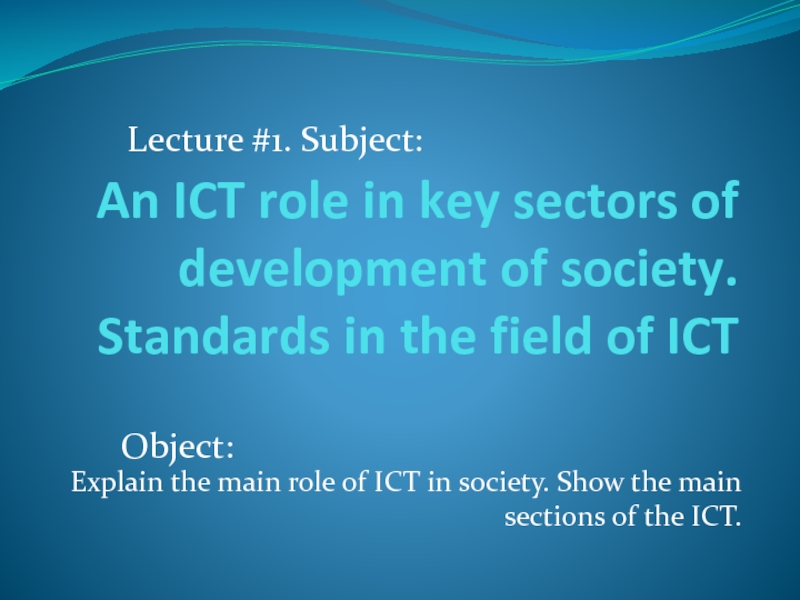
An ICT role in key sectors of development of society. Standards in the field of ICT
Explain the main role of ICT in society. Show the main sections of the ICT.
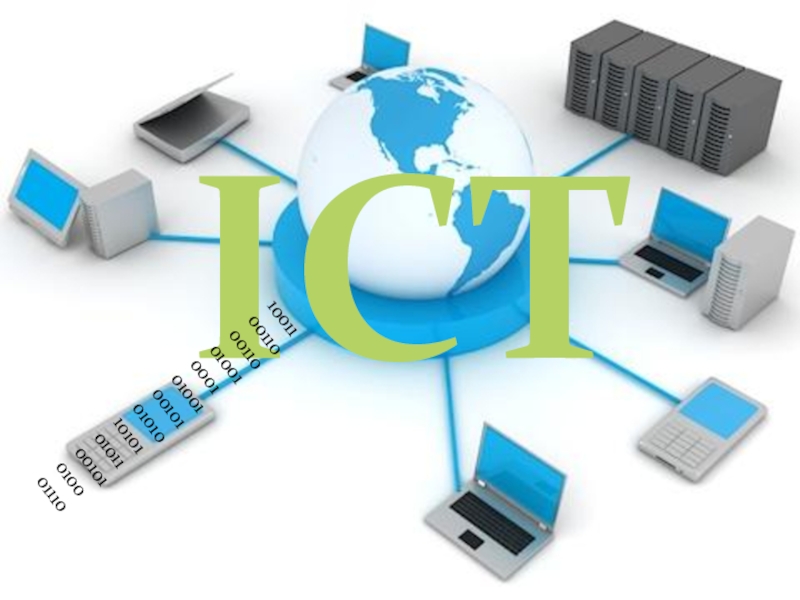
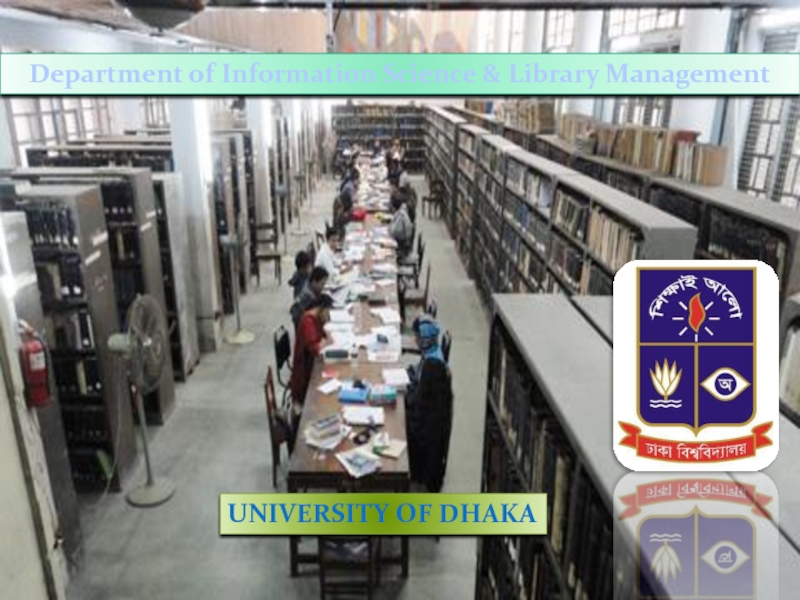
Department of Information Science & Library Management
UNIVERSITY OF DHAKA
* What is ICT?
* Definitions of ICTs
* ICT impact on different fields
* Impact of ICT on society
* Impact of ICT on Education
* Impact of ICT on Communication
* Impact of ICT on Scientific Exploration
* Impact of ICT on Military Force
* Impact of ICT on Economic Structure
* Impact of ICT on Recreation
* Impact of ICT on Transportation
* Impact of ICT on Knowledge Management
* Impact of ICT on Information Institution
* Impact of ICT on Library Materials
* Impact on User Community
* Conclusion
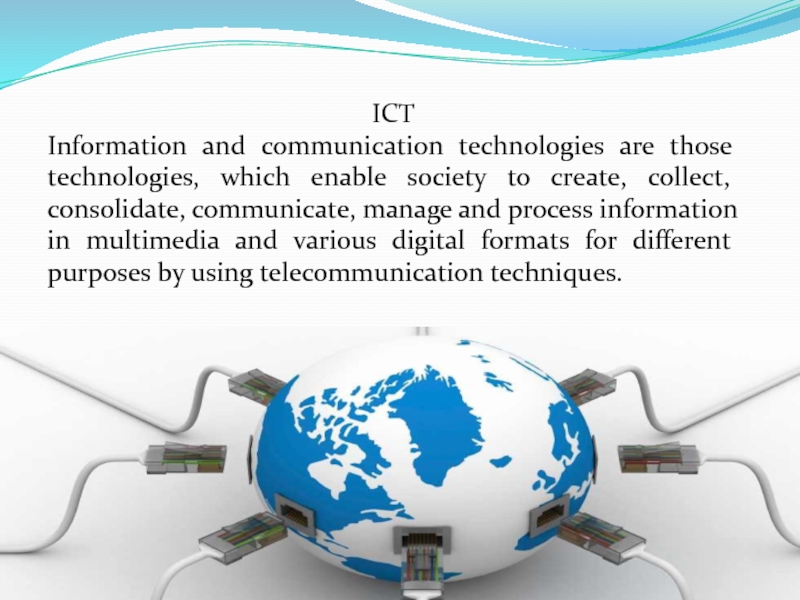
ICT
Information and communication technologies are those technologies, which enable society to create, collect, consolidate, communicate, manage and process information in multimedia and various digital formats for different purposes by using telecommunication techniques.
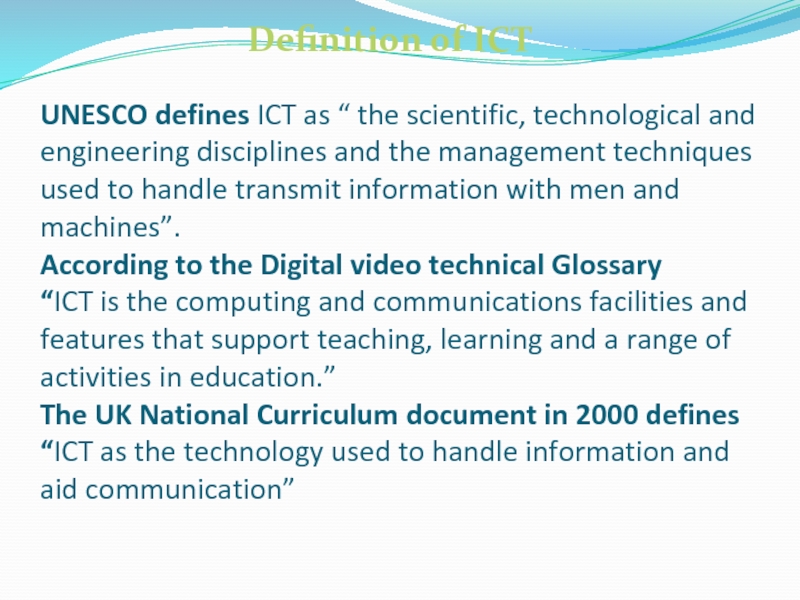
UNESCO defines ICT as “ the scientific, technological and engineering disciplines and the management techniques used to handle transmit information with men and machines”. According to the Digital video technical Glossary “ICT is the computing and communications facilities and features that support teaching, learning and a range of activities in education.” The UK National Curriculum document in 2000 defines “ICT as the technology used to handle information and aid communication”
Definition of ICT
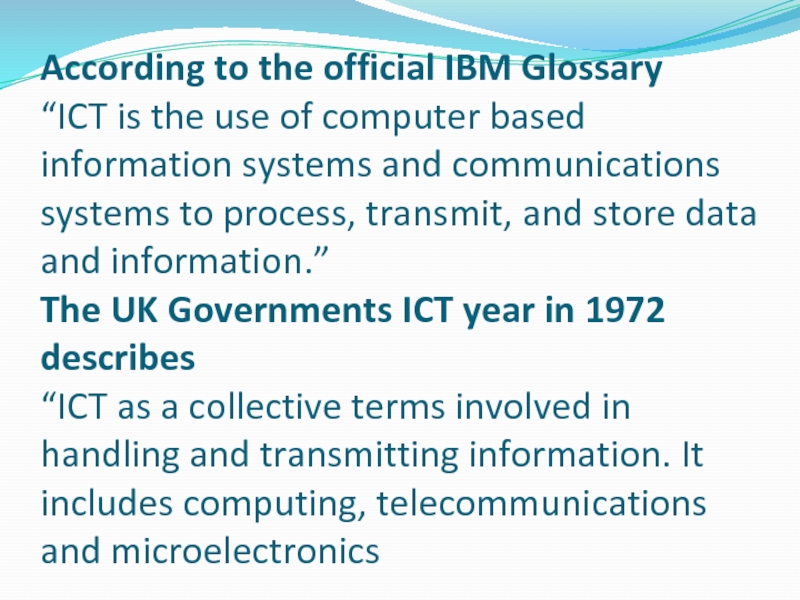
According to the official IBM Glossary “ICT is the use of computer based information systems and communications systems to process, transmit, and store data and information.” The UK Governments ICT year in 1972 describes “ICT as a collective terms involved in handling and transmitting information. It includes computing, telecommunications and microelectronics
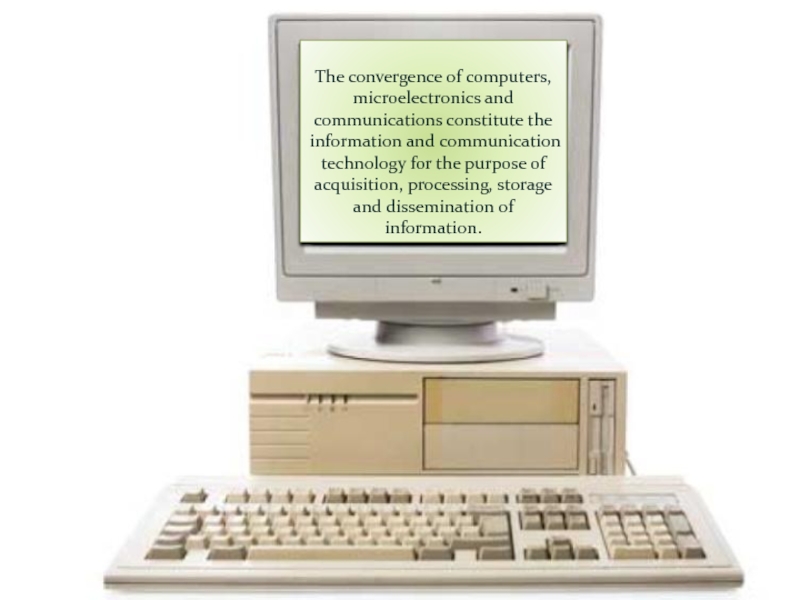
The convergence of computers, microelectronics and communications constitute the information and communication technology for the purpose of acquisition, processing, storage and dissemination of information.
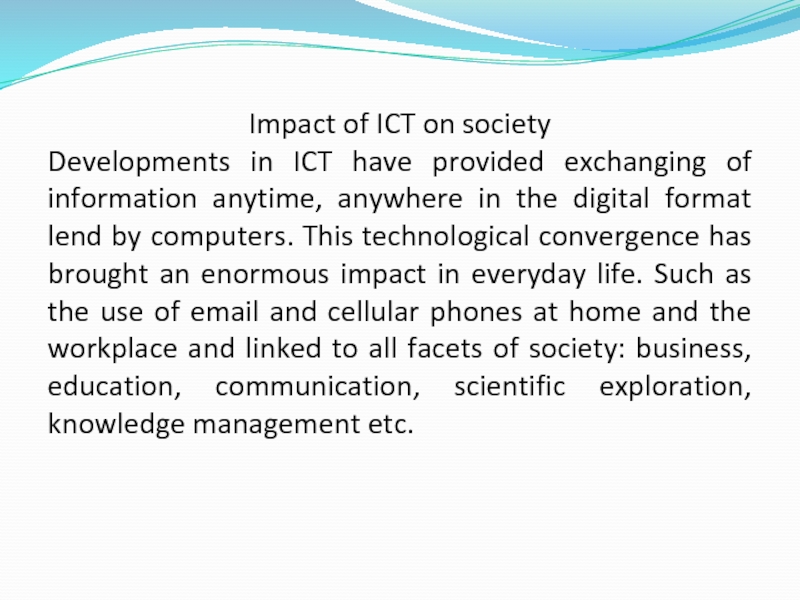
Impact of ICT on society
Developments in ICT have provided exchanging of information anytime, anywhere in the digital format lend by computers. This technological convergence has brought an enormous impact in everyday life. Such as the use of email and cellular phones at home and the workplace and linked to all facets of society: business, education, communication, scientific exploration, knowledge management etc.
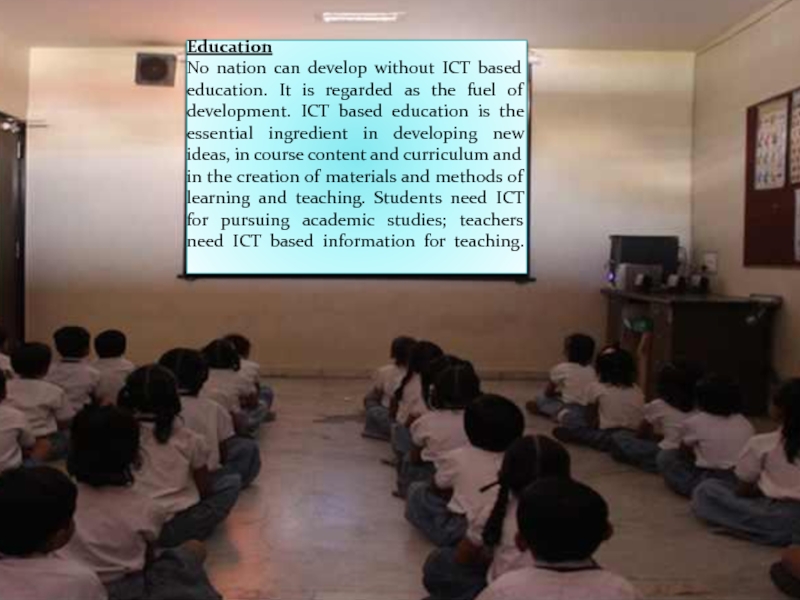
Education No nation can develop without ICT based education. It is regarded as the fuel of development. ICT based education is the essential ingredient in developing new ideas, in course content and curriculum and in the creation of materials and methods of learning and teaching. Students need ICT for pursuing academic studies; teachers need ICT based information for teaching.
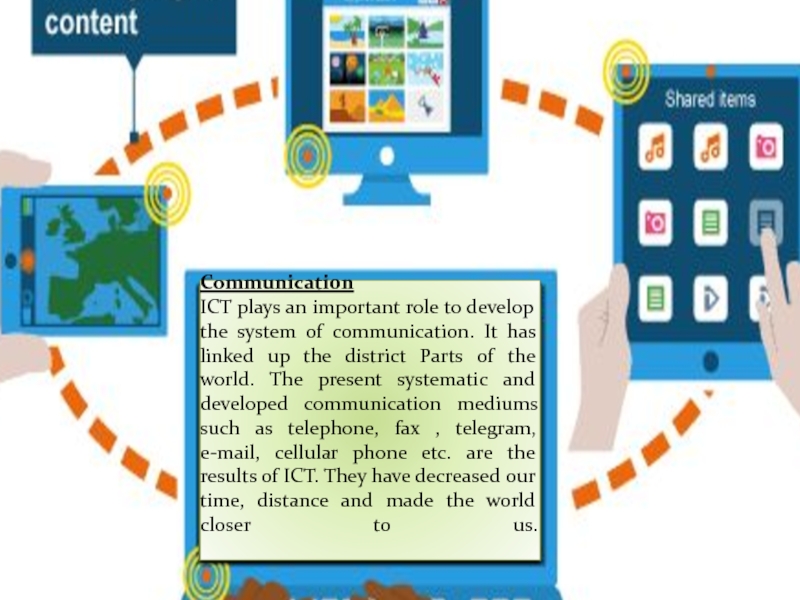
Communication ICT plays an important role to develop the system of communication. It has linked up the district Parts of the world. The present systematic and developed communication mediums such as telephone, fax , telegram, e-mail, cellular phone etc. are the results of ICT. They have decreased our time, distance and made the world closer to us.
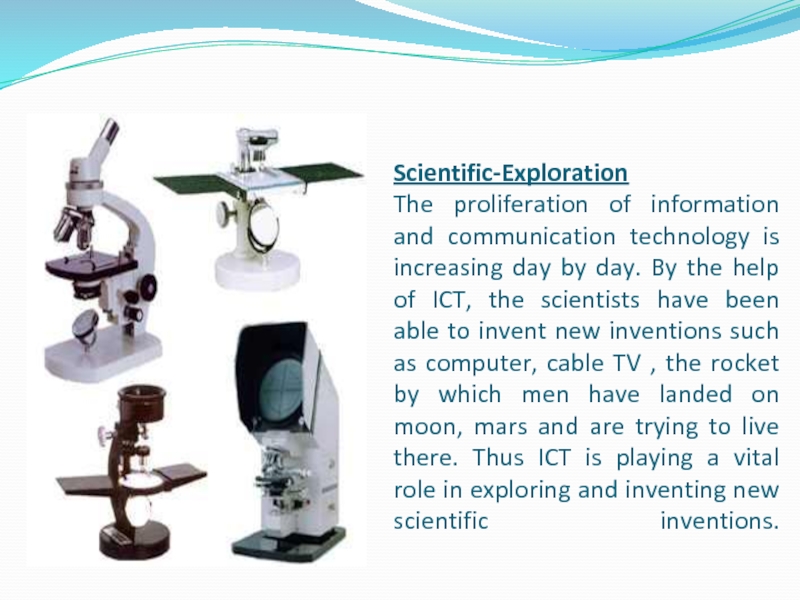
Scientific-Exploration The proliferation of information and communication technology is increasing day by day. By the help of ICT, the scientists have been able to invent new inventions such as computer, cable TV , the rocket by which men have landed on moon, mars and are trying to live there. Thus ICT is playing a vital role in exploring and inventing new scientific inventions.
Military-Force To protect any country from the attack of enemies, a strong and well-organized military force is a must. ICT plays as a key role to strong and organized the military force of any country by providing real information. So , it is an important component for the military sector.
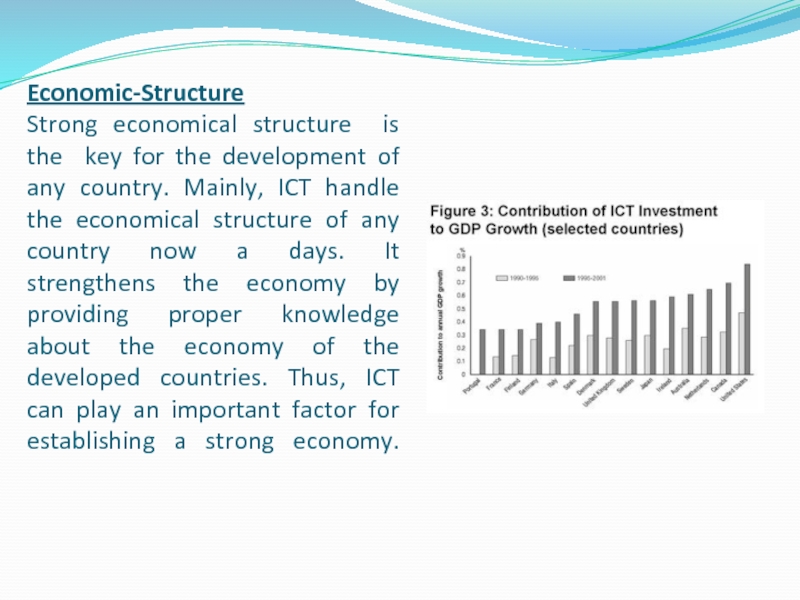
Economic-Structure Strong economical structure is the key for the development of any country. Mainly, ICT handle the economical structure of any country now a days. It strengthens the economy by providing proper knowledge about the economy of the developed countries. Thus, ICT can play an important factor for establishing a strong economy.

Recreation ICT has given us a number of recreational components , such as television , radio, tape recorder , V.C.R, D.V.D, Mp3, gramophone, etc. by which we pass our leisure sitting in our own place.
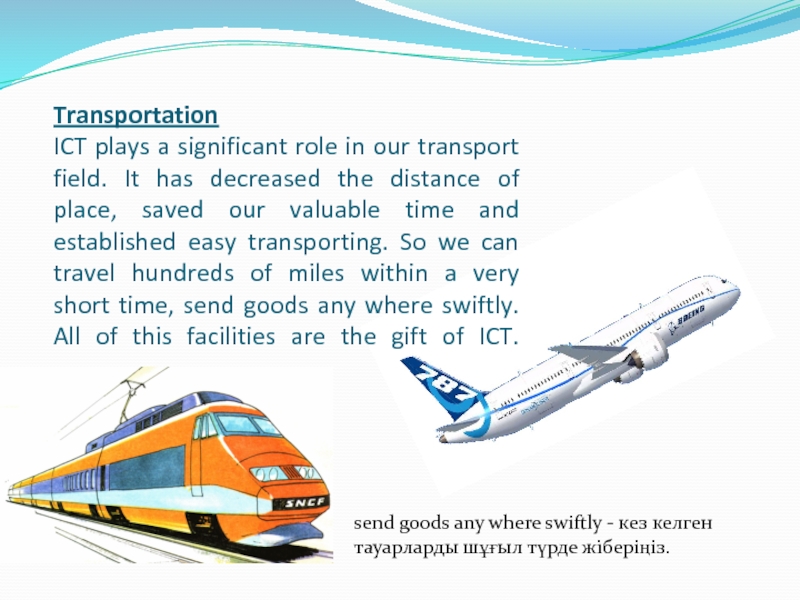
Transportation ICT plays a significant role in our transport field. It has decreased the distance of place, saved our valuable time and established easy transporting. So we can travel hundreds of miles within a very short time, send goods any where swiftly. All of this facilities are the gift of ICT.
send goods any where swiftly - кез келген тауарларды шұғыл түрде жіберіңіз.
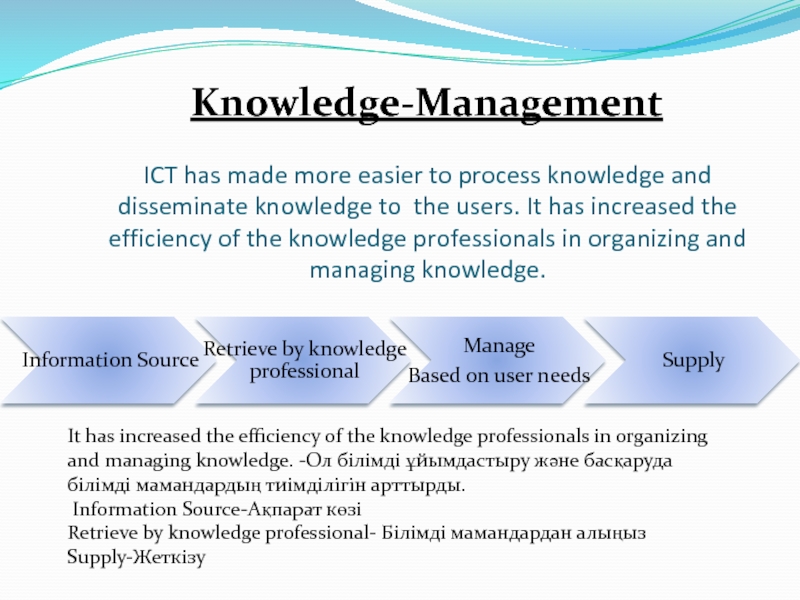
ICT has made more easier to process knowledge and disseminate knowledge to the users. It has increased the efficiency of the knowledge professionals in organizing and managing knowledge.
It has increased the efficiency of the knowledge professionals in organizing and managing knowledge. -Ол білімді ұйымдастыру және басқаруда білімді мамандардың тиімділігін арттырды.
Information Source-Ақпарат көзі
Retrieve by knowledge professional- Білімді мамандардан алыңыз
Supply-Жеткізу
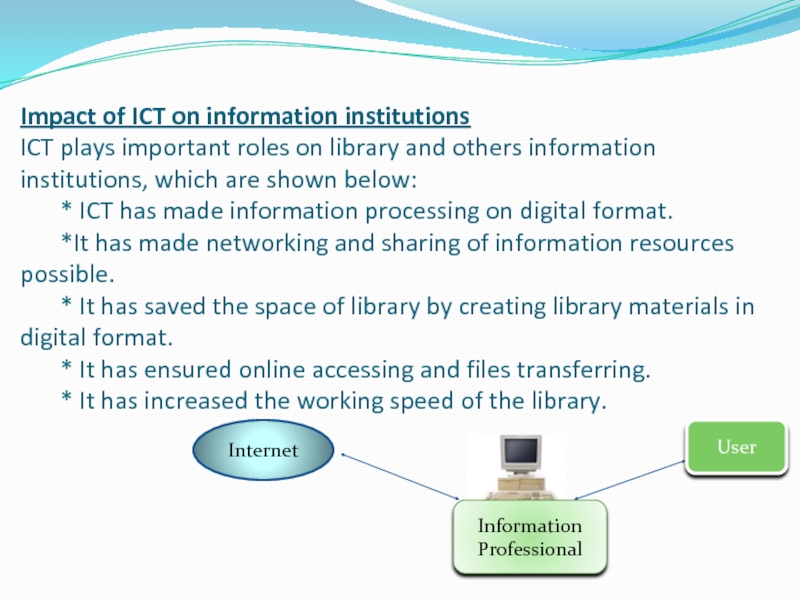
Impact of ICT on information institutions ICT plays important roles on library and others information institutions, which are shown below: * ICT has made information processing on digital format. *It has made networking and sharing of information resources possible. * It has saved the space of library by creating library materials in digital format. * It has ensured online accessing and files transferring. * It has increased the working speed of the library.
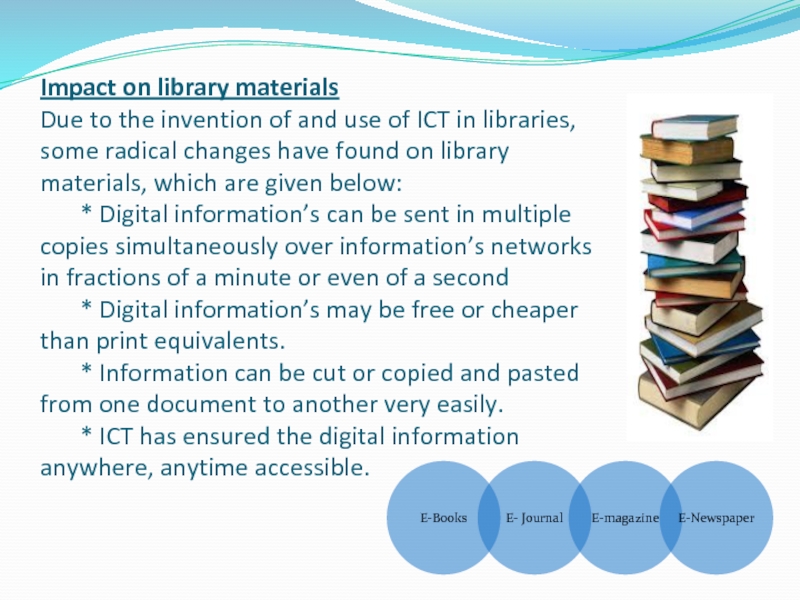
Impact on library materials Due to the invention of and use of ICT in libraries, some radical changes have found on library materials, which are given below: * Digital information’s can be sent in multiple copies simultaneously over information’s networks in fractions of a minute or even of a second * Digital information’s may be free or cheaper than print equivalents. * Information can be cut or copied and pasted from one document to another very easily. * ICT has ensured the digital information anywhere, anytime accessible.
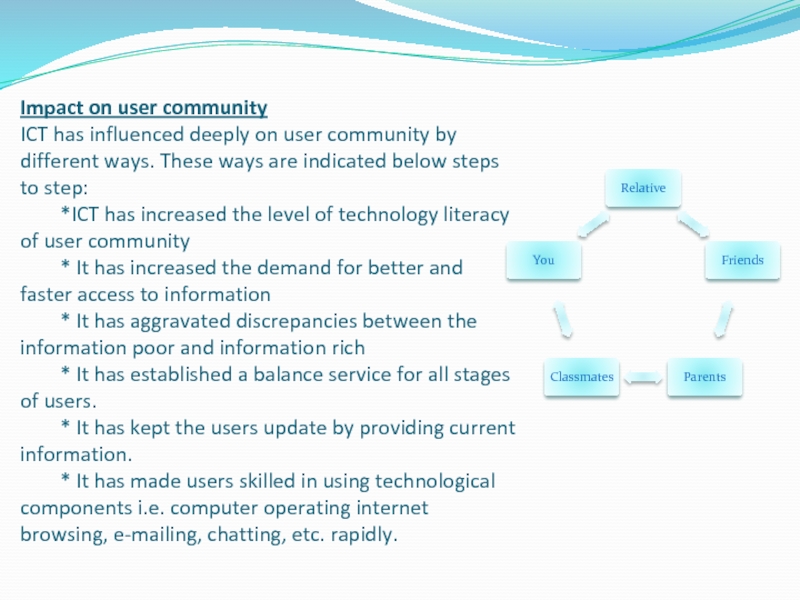
Impact on user community ICT has influenced deeply on user community by different ways. These ways are indicated below steps to step: *ICT has increased the level of technology literacy of user community * It has increased the demand for better and faster access to information * It has aggravated discrepancies between the information poor and information rich * It has established a balance service for all stages of users. * It has kept the users update by providing current information. * It has made users skilled in using technological components i.e. computer operating internet browsing, e-mailing, chatting, etc. rapidly.
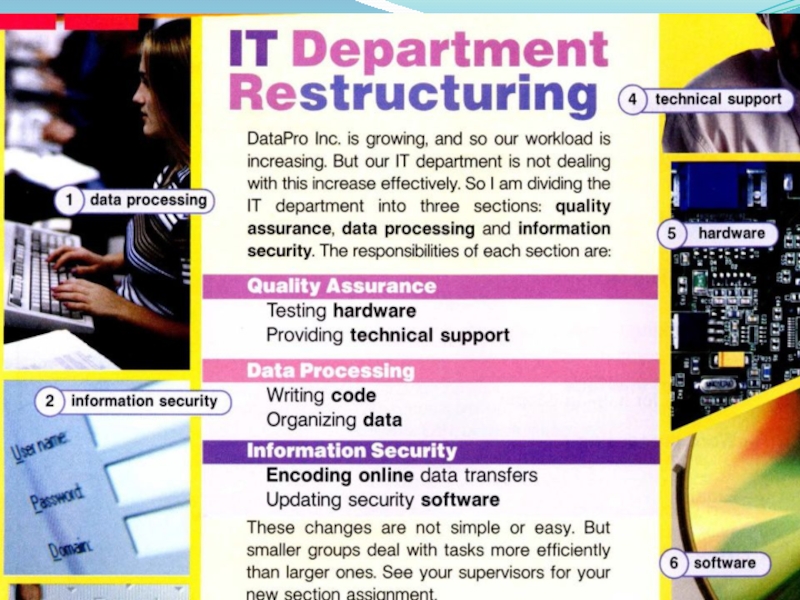
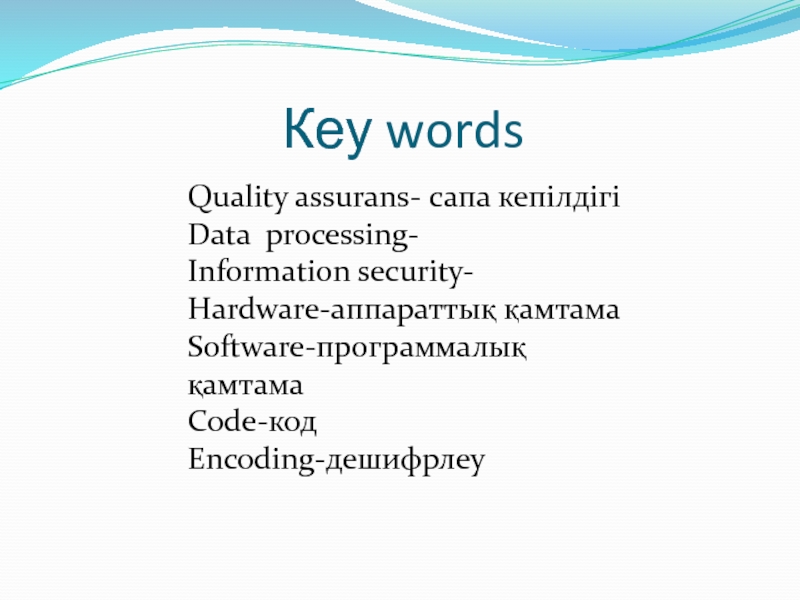
Quality assurans- сапа кепілдігі
Data processing-
Information seсurity-
Hardware-аппараттық қамтама
Software-программалық қамтама
Code-код
Encoding-дешифрлеу
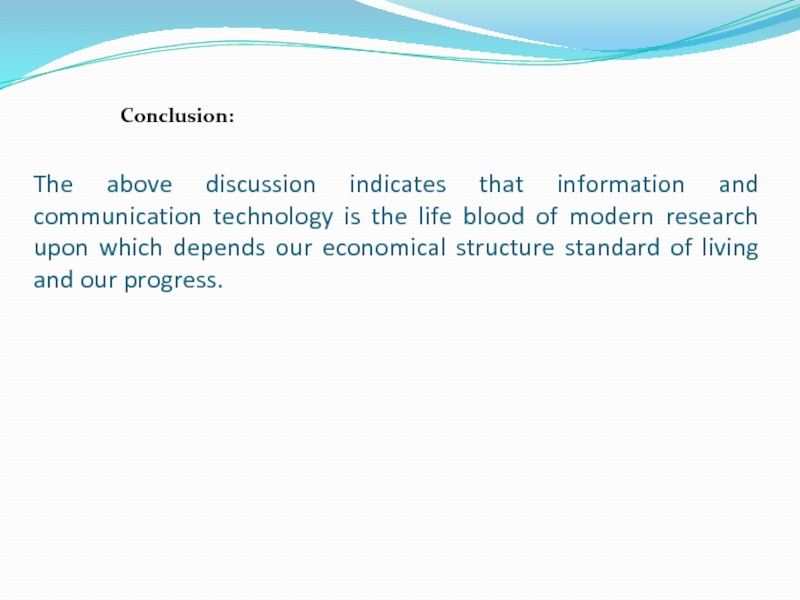
The above discussion indicates that information and communication technology is the life blood of modern research upon which depends our economical structure standard of living and our progress.
Вы можете изучить и скачать доклад-презентацию на тему An ICT role in key sectors of development of society. Standards in the field of. Презентация на заданную тему содержит 20 слайдов. Для просмотра воспользуйтесь проигрывателем, если материал оказался полезным для Вас - поделитесь им с друзьями с помощью социальных кнопок и добавьте наш сайт презентаций в закладки!




















Plan: I. Introduction II. Main part 1. ICT definition. The subject of ICT and its objectives. The role of ICT in the development of society. 2. Standards in the field of ICT. Communication between ICT and achievement of the objectives of a sustainable development in the Millennium Declaration. 3. ICT in Key Sectors: Telecommunications Public Sector Management Education Health Agriculture and Food Security III. Conclusion
Introduction Head of the state, Nursultan Nazarbayev, initiated a Nation plan "100 specific steps", oriented to production modernization, increasing of investment activity, prevention of reduced income and creating new vacancies. All this will promote employment of population, including ICT field. This means that, ICT is very common in the modern world. And everyone should know the subject and purpose of the industry.
Information and communication technologies (ICT) - a set of methods, workflows and software and hardware tools that are integrated with the aim of collecting, processing, storage, distribution, display and use of information for the benefit of its members Information and communication technologies (ICT) - a set of methods, workflows and software and hardware tools that are integrated with the aim of collecting, processing, storage, distribution, display and use of information for the benefit of its members To date, the concept of IT includes microelectronics, development and production of computers and software, connection and telephony, mobile services, providing Internet access, providing information resources of the Internet, as well as a variety of cultural phenomena associated with these areas of activity and rules (both formal and informal) that govern these areas of activity.
The potential of ICT as a development tool rests on its ability to improve the way people do things. The rapid changes and advancements in modern technology present a unique opportunity for developing countries to leapfrog intermediate steps in development while improving the quality and broadening the reach of public services. The strategic and effective use of ICT—combined with a reform-oriented mindset, necessary set of skills, institutional structure and capacity, appropriate business models, as well as policy and regulatory environments—can facilitate fast and efficient delivery of public services in key sectors.
ICT-standards system - a set of normative and technical and regulatory guidance documents, including a set of interrelated standards and other documents in the field of standardization related to ICT, documents defining the methodology of development, coordination, approval, modification, deployment, use and replacement, including a methodology to assess facilities for compliance with these standards and other documents in the field of standardization.
ICT industry - as a specific field of activity, which includes research, creation, development, evaluation, procurement, acquisition, implementation, operation and utilization of ICTs. It covers thus work as a developer and ICT suppliers and customers and users of ICT, including the activities for the implementation, operation and utilization of ICTs.
Industry Standard (IS) - standard related to processes, products and other aspects of a particular field of activity (whether commercial or not aimed at profit). In this document, under the industry standard it refers to a standard or other document in the field of standardization, designed for the use of ICT. The procedure for the development and application of established IS specialized body of public administration.
Standard - a document in the field of standardization, standardization of relevant principles, covering categories such documents as the standard of organization, the standard non-profit association, the industry standard or set of rules (the industry), the national standard, international standard.
International standard - a standard adopted by an international organization. National standard - a standard adopted by a national authority of the Republic of Kazakhstan for Standardization. Non-profit association Standard - a standard non-profit professional organization (union, association, etc.), designed for wide application by different stakeholders. The order of development of the standard and non-profit association established this association and is harmonized with the state and industry standards development orders.
Organization Standard - a standard developed and approved by the organization itself, based on the necessity of its use to improve production and quality assurance of products, works and services, as well as for the dissemination and use of knowledge in different fields of research results (the test), measurement and development.
Telecommunications ADB support for telecommunications and ICT is changing lives across the region. Farmers and fisher folk receive timely weather forecasts through their mobile phones, remote village schools connect to educational resources through internet -enabled computer labs, and citizens transact with their governments more efficiently through online systems. ADB is also helping to expand telecommunication networks, provide shared ICT access facilities like Community e-Centers (CeCs), and develop innovative and relevant ICT applications.
ICT in Education ICT can improve the efficiency and quality of education at all levels. Part of ADB's strategy to support its education policy principles is promoting "experimentation with, and dissemination of, innovative strategies and technologies in education." This involves developing appropriate e-applications to help DMCs leapfrog conventional means of learning and teaching . For example, Uzbekistan’s Information and Communications Technology in Basic Education Project, supported by a $30-million ADB loan, is bringing education to remote rural areas and benefiting 540,000 students.
ICT in Public Sector Management ADB encourages governments to adopt both innovative approaches and modern technologies to promote good governance. This is done not just by shifting from manual, paper-based processes to automated systems, but also by creating new skills, building human and institutional capacity, and creating an enabling policy and regulatory environment to facilitate public sector reforms.
ICT in Health ICT can be a powerful tool for improving health and related services. ADB projects are helping to improve dissemination of public health information, bridge the gap in consultation, diagnosis, and treatment between resource-rich and resource-poor hospitals, facilitate learning, enhance the ability to monitor diseases and other health issues, and make health administration more efficient.
ICT in Agriculture and Food Security ADB’s ICT efforts are raising agricultural productivity and the quality of life of farmers and the rural poor by improving information flows, communication, and access to reliable, up-to-date information. This enables strategic decision-making by farmers and prevents or mitigates losses caused by natural disasters.
Conclusion Over time, emphasis on technology-dominated structures should be lessened and ICT should be highlighted more. ICT are people who understand and have expertise on both the technicalities of ICT and the intricacies of development.
Читайте также:

